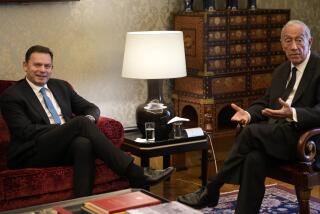Bhutto Seeks to Form Pakistani Coalition Government : Election: Her party wins 86 seats in 217-member assembly, and she bargains with minor parties for support.
- Share via
KARACHI, Pakistan — A jubilant Benazir Bhutto, whose Pakistan People’s Party emerged with a slim margin of victory in national parliamentary elections, began bargaining with smaller parties Thursday in an effort to form Pakistan’s next government.
Bhutto’s party won 86 of the 217 seats in the National Assembly in Wednesday’s election, giving her a plurality but not the absolute majority necessary to form a government on her own.
The Pakistan Muslim League of Bhutto’s main rival, Nawaz Sharif, won 72 seats, so Bhutto will have the first chance to form a coalition of smaller parties and independents.
“We are going to form the next government, there is no doubt about it,” the 40-year-old Bhutto told reporters Thursday at her ancestral home in the village of Naudero. “Of course, we were surprised, because we expected a much larger margin.”
She also complained that her supporters had been turned away from voting stations across the country because of what she called tampering with voter lists, but she did not indicate whether she intended to pursue the charges.
If she succeeds in her negotiations, Bhutto will again become prime minister. She held the job for 20 months after winning an election in 1988, becoming the modern Muslim world’s first female head of government.
An aide said she spent the day Thursday on the telephone with likely coalition partners, beginning the “horse trading” in which government jobs and other inducements are offered in exchange for support in Parliament. The new prime minister will be elected Oct. 19.
According to the aide, Bhutto has already lined up support from 21 legislators from smaller parties, putting her close to the 109 needed for an absolute majority. Of the 217 parliamentary seats, 207 were filled by direct voting Wednesday, and 10 more allotted to non-Muslim religious minorities were counted separately.
Political analysts said Bhutto’s narrow victory resulted largely from a boycott of the elections by a small ethnic party, the Mohajir Qaumi Movement, based in the southern cities of Karachi and Hyderabad.
Made up mainly of immigrants from India, that party won 15 seats in the last election, but those seats are now divided between Bhutto’s party and Sharif’s. If there had been no boycott, the party would probably have gone into coalition with Sharif, making the election a draw.
Voter turnout in Karachi, Pakistan’s largest city, was as low as 12%; it was about 41% nationwide.
Another factor in the slim margin for the People’s Party was the poor showing of the Pakistan Islamic Front, which won only three seats. In the 1990 election, the party was in coalition with Sharif, but this time, Bhutto lieutenants had expected the Islamic parties to siphon votes from Sharif’s party.
Still, the election victory was a personal triumph for Bhutto, who remains one of the most charismatic figures in Pakistan despite having been ousted in 1990. The PPP was founded by her father, Zulfikar Ali Bhutto, who became Pakistan’s first elected prime minister. He was deposed in a military coup in 1977 and was hanged two years later.
Bhutto has pledged to “end Pakistan’s isolation” internationally, an apparent reference to a U.S. decision to cut off sales of military equipment because of Pakistan’s efforts to develop a nuclear weapon.
She has also promised to improve the domestic economy and increase government spending on education and health.
Bhutto was dismissed by President Ghulam Ishaq Khan in 1990 because of alleged corruption and mismanagement. After similar charges were made against Sharif, Ishaq Khan and Sharif resigned in July and a caretaker government was appointed.
More to Read
Sign up for Essential California
The most important California stories and recommendations in your inbox every morning.
You may occasionally receive promotional content from the Los Angeles Times.













